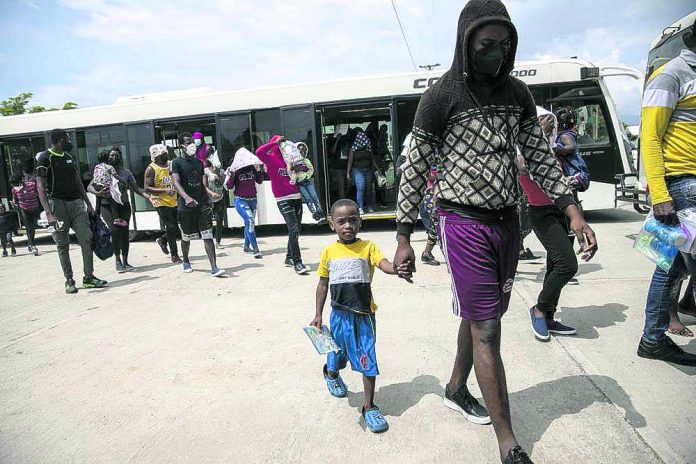By JUAN A. LOZANO, ERIC GAY, ELLIOT SPAGAT and EVENS SANON
Associated Press
DEL RIO, Texas (AP) — The U.S. flew Haitians camped in a Texas border town back to their homeland Sunday and tried blocking others from crossing the border from Mexico in a massive show of force that signaled the beginning of what could be one of America’s swiftest, large-scale expulsions of migrants or refugees in decades.
More than 320 migrants arrived in Port-au-Prince on three flights, and Haiti said six flights were expected Tuesday. In all, U.S. authorities moved to expel many of the more 12,000 migrants camped around a bridge in Del Rio, Texas, after crossing from Ciudad Acuña, Mexico.
The only obvious parallel for such an expulsion without an opportunity to seek asylum was in 1992 when the Coast Guard intercepted Haitian refugees at sea, said Yael Schacher, senior U.S. advocate at Refugees International whose doctoral studies focused on the history of U.S. asylum law.
Central Americans have also crossed the border in comparable numbers without being subject to mass expulsion, although Mexico has agreed to accept them from the U.S. under pandemic-related authority in effect since March 2020. Mexico does not accept expelled Haitians or people of other nationalities outside of Mexico, Guatemala, Honduras and El Salvador.
When the border was closed Sunday, the migrants initially found other ways to cross nearby until they were confronted by federal and state law enforcement. An Associated Press reporter saw Haitian immigrants still crossing the river into the U.S. about 1.5 miles (2.4 kilometers) east of the previous spot, but they were eventually stopped by Border Patrol agents on horseback and Texas law enforcement officials.
Agents yelled at the migrants who were crossing in the waist-deep river to get out of the water. The several hundred who had successfully crossed and were sitting along the river bank on the U.S. side were ordered to the Del Rio camp. “Go now,” agents yelled. Mexican authorities in an airboat told others trying to cross to go back into Mexico.
Mexico said Sunday it would also begin deporting Haitians to their homeland. A government official said the flights would be from towns near the U.S. border and the border with Guatemala, where the largest group remains.
Haitians have been migrating to the U.S. in large numbers from South America for several years, many having left their Caribbean nation after a devastating 2010 earthquake. After jobs dried up from the 2016 Summer Olympics in Rio de Janeiro, many made the dangerous trek by foot, bus and car to the U.S. border, including through the infamous Darien Gap, a Panamanian jungle.
Some of the migrants at the Del Rio camp said the recent devastating earthquake in Haiti and the assassination of President Jovenel Moïse make them afraid to return to a country that seems more unstable than when they left.

















